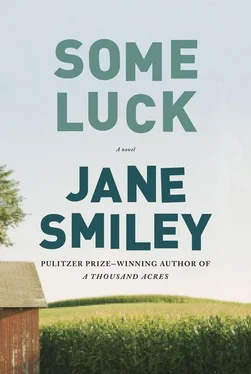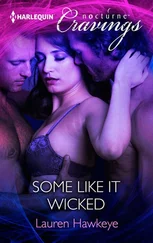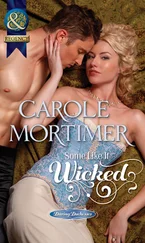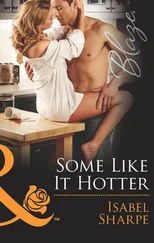“Oh, for goodness’ sake,” said Rosanna.
“Send ’em to the slaughter, more likely,” said Ragnar.
“He’s only got two, and they’re old,” said Walter. “If he buys that tractor, he can turn them out. He’s got plenty of grass for two horses in among the cows.”
“If we got a tractor, would you shoot Jake and Elsa?” said Joey.
“No,” said Walter. “Anyway, I prefer horses. This is what horses do. You boys listening?”
Joey and Frankie nodded.
“Every spring, horses pull the plow and then the planter, and so they plant their own oats. In the summer, they pull the thresher. What’s the thresher, Frankie?”
“The thresher takes the oats from the straw. This summer, I’m going to ride the thresher, and make the oats go into the wagon.”
“That’s right. So, when the oats are threshed, then the horses are fixing their own supper, and when the oats and hay are hauled to the barn, the horses are putting their supper away. Then what happens?”
The boys’ mouths had opened a little bit.
Walter said, “In the winter, the horses take their own manure out and spread it on the oat field. What does that do?”
“Fertilize!” shouted Frankie.
“So where do the horses go to get food?”
“Out to the barn,” said Joey.
“Right where they put it,” said Walter. “Where does Mr. Frederick go to get gas for the tractor?”
This was a stumper.
Neither boy knew the answer.
Walter ate a bite of meatloaf and some potato, and said, “Texas. And, boys, if you have to go to Texas for something, you don’t need it.”
He of course spoke with a good deal of self-satisfaction. But he knew anyway that that tractor was going to buzz around his head like a pesky fly, and it did, all night long, in and out of all sorts of dreams that otherwise had nothing in common with one another.
ROSANNA KNEW that not only Walter, but Granny Elizabeth and all of the Langdons would be upset when they heard the news, so she didn’t exactly tell them. Instead, she got up early that Sunday morning and had breakfast all made by six — a good breakfast, too, pancakes and some raspberries she went out and picked off the bushes, bacon, and oatmeal with sprinklings of brown sugar, because Walter couldn’t start his day without oatmeal. Then, while they were eating, she laid out the boys’ Sunday best, which she had spent an hour the previous afternoon ironing, and of course they all thought they were heading off to their own Methodist church in town, where all the Langdons had gone forever, the same church that Rosanna had once considered radically Protestant and fearsome. But no, she said, after she had Lillian dressed in a beautiful green dress with a white pinafore (she herself was dressed very plainly, in a flat sort of blue dress, with her hair in a secure bun), they were going a bit farther afield, just to try it out, to the Assemblies of God church in Usherton.
“Usherton!” Walter scowled. “That’s—”
“Eleven miles door to door,” said Rosanna. “Twenty minutes, and right on the north end of Second Street. We passed it two weeks ago, when we went to the picture show.” Walter had wanted to go to the picture show and see Buster Keaton in Steamboat Bill, Jr . Rosanna, knowing this was an opportunity to look for the church, had gone along, not said a word about missing their Bible reading for that night. Even so, she wasn’t quite sure about the right way to think of pictures.
“Well, I—”
“We need to try it,” said Rosanna. “We need to.” And she spoke with such a tremor in her voice (not intended) that Walter didn’t even finish his sentence.
From the moment Walter started organizing the boys, and then Ragnar, around the prospect of being gone for almost three hours rather than just over one, like most Sundays, Rosanna could feel herself relaxing. The fact was, Rosanna had been feeling in danger lately — more and more every day and week — and her own avid Bible reading did not ease her feeling. She had tried several methods — starting at the beginning and reading, opening at random, looking for familiar stories and starting with the passage Pastor Gordon used in his Sunday sermon. But she always foundered sooner or later. When she began at the beginning, she could not get past the shoals of names and genealogies, because she didn’t know if there was more there than met the eye. Opening at random could be enlightening, but more often than not it was confusing — what was she to make of opening somewhere in Leviticus and reading all those rules she couldn’t understand? But, then, Jesus did some unaccountable things, too — not miracles, like the loaves and the fishes, but denouncing that tree because it wouldn’t give him fruit. Catholics did not read the Bible, were not even allowed to read the Bible, and surely this was the reason. In the Catholic Church, it was all laid out for you in the missal and the progression from one holy day to the next, and everything made sense, but, then again, you were not saved in the Catholic Church — she knew that — so mere intelligibility wasn’t enough. Pastor Gordon’s sermons were very dry, almost always about either brotherly love or service to the community, and never once about salvation, the feeling of salvation, as if Pastor Gordon hadn’t yet experienced that feeling. So — nothing there.
What she needed was for Walter, and especially Frankie and Joey, to be saved, as she had been, and they were not going to get that from the First Methodist Church (never followed by a second one) of Denby, Iowa. But she had overheard Lucy Morgan and Dan Crest talking at the store about the Assembly of God, and the pastor there, Roger Elmore, a personal friend of someone named E. N. Bell, who was famous and important in some way that Rosanna didn’t understand but appreciated anyway. “And also a fiery preacher,” said Lucy. “Set ’em all alight, even the icy ones!” and Dan Crest laughed. Rosanna knew that that was what Walter needed. And the boys needed to do more in Sunday school than fill in the stripes of Joseph’s coat of many colors.
It was a beautiful day, especially for late June, not very hot and with a little breeze. Walter never minded a drive once you got him off the farm — he liked to see that he was further along in his work, or at least that it was done more properly, than at the farms along the way. They skirted their own town, so it was all farms and fields until they got to the Iowa River. It was shady right around there, and a minute or two later, they came to the church. Only then, as they were driving down that street, did Rosanna remember that she knew no one in the church — not even Lucy Morgan, if it came to that, because her mother knew Lucy Morgan, but Rosanna had only ever spoken to her one time. It occurred to Rosanna that she should have told Lucy Morgan that she would like to visit her church.
They parked down the street, and walked back toward the church building, which wasn’t terribly big. Lillian insisted on walking and not being carried, but she put her hand in Rosanna’s very obediently and asked no questions — she was such a good child. It was as if she knew where they were going, and that she would be welcomed there. Semiconsciously, Rosanna slowed her steps so that Lillian preceded her just a tiny bit, so that Lillian’s beautiful and shining face would be the first one someone might see.
Walter caught up with her and said, “Joey, stay with Mama.” To Rosanna, he said, “Got a handful back here,” and Rosanna could hear that he did—“Where are we going? Is Granny Elizabeth here? I told Granny Elizabeth — Don’t hold me, I can walk by myself!” Rosanna looked down and said, “Joseph, take your thumb out of your mouth.” He did, but his thumb was pink and wet. An embarrassment. Now they were right in front of the church.
Читать дальше












